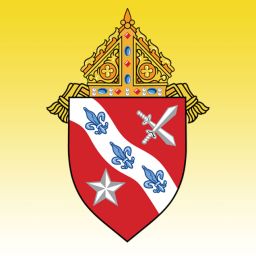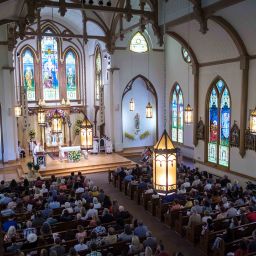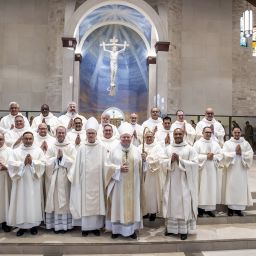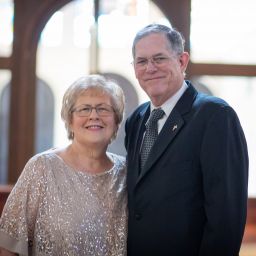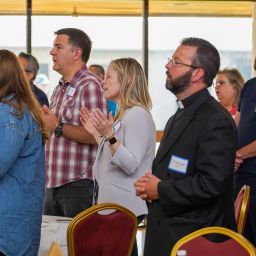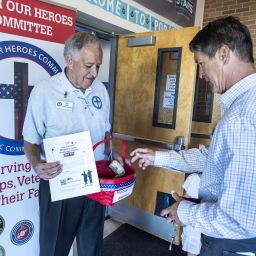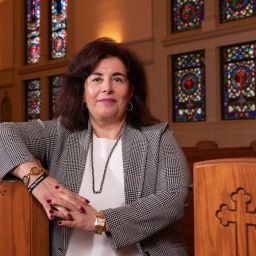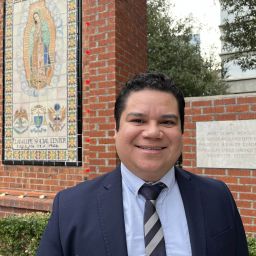By Amy White
The Texas Catholic
Protected in big, white beekeeping gear, under a bright midday sun, fifth grade students David Silva and Nicolas McAllister carefully inspect beehive frames as hundreds of bees swarm around them. The boys look attentively at the frames; they note the color of the pollen, the amount of honey, the eggs; they try to spot the queen among the crawling hoard of yellow insects.
“Grab this frame, hold it, and put the sun behind you so you can see in there. You see the eggs?” Shannon La Grave asked, guiding the boys in their hive inspection.
Silva and McAllister are students at Mount St. Michael Catholic School and members of the school’s bee club, a unique program that allows students to learn about apiculture in a hands-on way through the care and keeping of the hundreds of thousands of bees on their own school campus. This hive inspection, which took place at the school on Oct. 8, was one of many that have been led by La Grave and Chris Chance, the chief experience officer and founder of Oak Cliff Bee Company respectively, for the benefit of Mount St. Michael students.
Contact with creation
Stepping onto the Mount St. Michael grounds, visitors may notice something unique on campus: Next to the school parking lot, a small barn hosts a number of feathered, furry, or wooly farm animals. This collection of creatures is a part of the small classical school’s unique program of agricultural education that developed over recent years.
“The school year of 2018-19, we had a ‘Farm to Fable’ initiative that we started, looking at other ways to just bring God’s creation into all aspects of our school,” Melissa Castro, principal of Mount St. Michael, said. “Many families came together and built the barn. We started out with just a few chickens and some goats.”
Years later, the farm consists of six geese, six sheep, about 20 turkeys, 30 to 40 chickens, and a Great Pyrenees dog.
“The students take care of the animals every morning,” Castro said. “They gather the eggs. We usually get two to three dozen eggs a day, and we sell those to our families and friends.”
The school also began building outdoor classroom spaces on campus, with benches that could be converted to tabletops and outdoor whiteboards for open-air classes in religion, literature, science, and other subjects.
According to Castro, the incorporation of nature into education allows students to explore the outdoors, learn responsibility, and wonder at the glory of God’s creation. By embracing the outdoors, the school is “giving our students a greater understanding of what creation is, what God has provided for us,” she said.
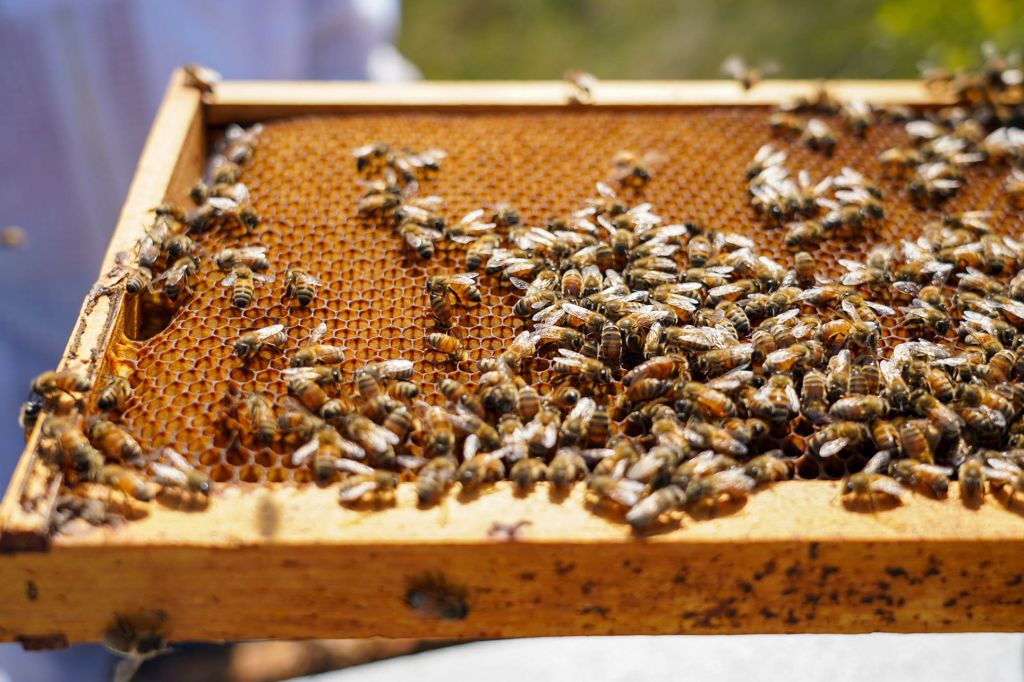
Bees on the scene
As the agriculture program grew, Chance, who along with his wife, Shannyn Chance, has overseen the program for years, decided that the program needed a source of revenue.
“It was getting pretty expensive—electric fencing, pallets, metal containers, food, everything else,” Chance recalled. He suggested a solution: bees.
During the 2021-2022 school year, the school brought several beehives onto campus and established the Mount St. Michael bee club.
“I was working with one of the other parents here, and we thought that we knew enough to start a bee club,” Chance said. “And so, every Thursday, we would meet and generally have four or five kids that want to participate in it.”
Chance said the bee club offers fourth through eighth grade students a chance to learn about apiculture and to try it out for themselves.
“When we start in January, it’s too cold to go spend a lot of time with the bees,” he said, “so we’re going through beekeeping 101 and talking about the hardware, the physiology of bees, the anatomy of the bees, just getting them exposed to the different facets of beekeeping. And then, as it warms up just a little bit… We order in bees.”
A few students even helped harvest honey over the summer, Chance shared.
La Grave, who assists with the apiculture lessons, spoke highly of the program.
“We get to give back to the community here and be involved with Mount St. Michael’s in such a fun way,” she said, “to have the bees on the property, to be able to take [students] through what the bees are, how they contribute to agriculture, what’s so important about them.”
Currently, there are 10 to 12 hives on the Mount St. Michael campus, each hive housing about 60,000 bees, though the numbers change seasonally. Chance emphasized that the presence of these bees on campus is consistent with the school’s broader emphasis on agricultural literacy.
“Bees are a crop, just like corn or soybeans or anything else,” he said. “You have good years; you have bad years; and so, it’s really cool to get the kids out.”
“For me, it was just surprising and fun being able to deal with the bees,” bee club member McAllister said.
David Silva concurred.
“I’ve learned how to open up beehives. I actually never knew that you used a hive tool,” the fifth grader said. “It was very cool, because first we were over in the library learning about bees and how they produce honey, pollen, what capped brood is… I like it a lot.”
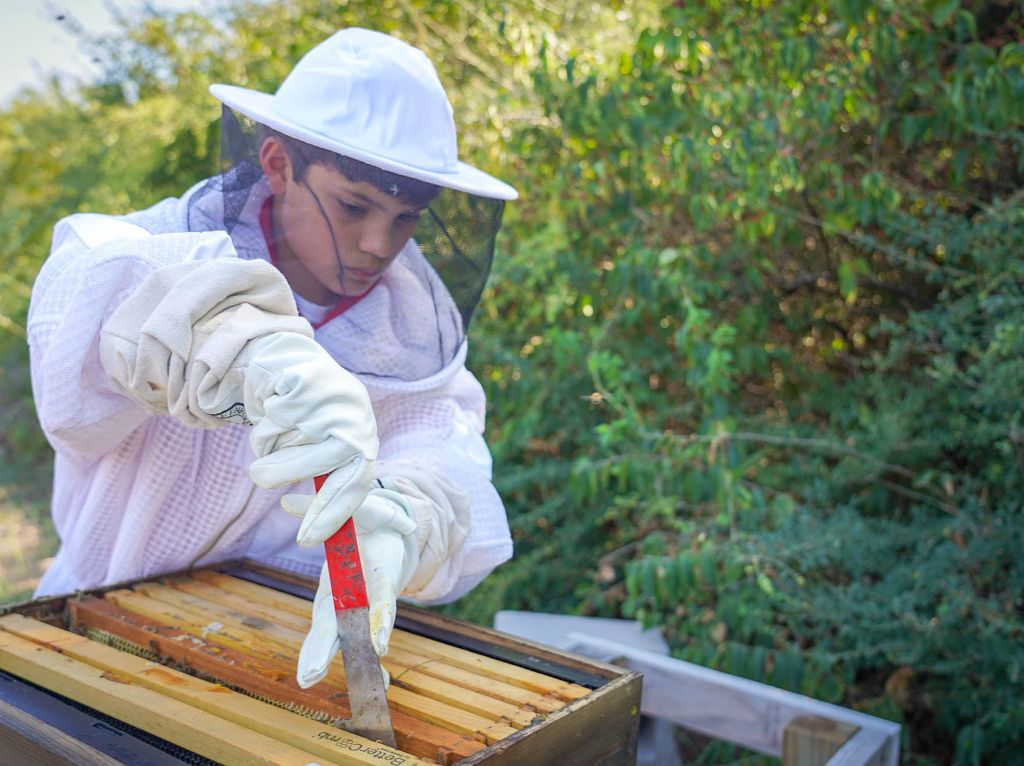
Mastering apiculture
Izzy Silva, an eighth-grade member of the Mount St. Michael bee club, recalled being scared and unsure the first time she interacted with the insects on campus. But now, after years of tending to the hives, she is not only confident around the buzzing, swarming creatures, but she has also begun her journey to becoming a master beekeeper.
“As we are working together, Chris and I, for Oak Cliff Bee Company, we’ve ended up having the opportunity to have several kids actually go through the Master Beekeeping Program,” La Grave said. “For the kids in the first level, they have to know enough about beekeeping; they have to have been a beekeeper for a year; and then they go and take the test at Texas A&M.”
“There was quite a bit of studying,” Silva recalled. “You go over the diseases… American foulbrood, European foulbrood. Then you have to go over the types of bees, the worker bees, the lifespan, and really just the patterns you’re looking for.”
Silva also needed to lead a hive inspection. She said her experience in the bee club prepared her to succeed. Over this past summer, she earned her certification and now dons the title of apprentice beekeeper.
Reflecting on the accomplishment, Silva expressed gratitude for the agricultural program at Mount St. Michael that led her to becoming a skilled beekeeper. She also said that she thinks agriculture should be a normal topic of conversation, “as normal as talking about politics, because it’s very important.”
“If I were to pursue a career in technology,” she added, “I would still be able to look outside and see the way I’ve been raised, which is to really love and nurture things that are around me.”
Cutline for featured image: David Silva, a fifth-grade student at Mount St. Michael Catholic School, inspects a frame during a hive inspection at the school on Oct. 8, while Shannon La Grave, left, supervises. (AMY WHITE/The Texas Catholic)



